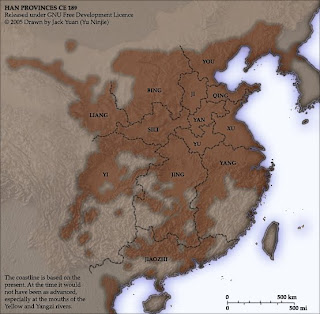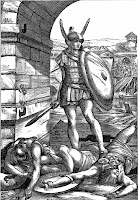by Homer
"On this the rest of the Achaeans with one voice were for
respecting the priest and taking the ransom that he offered; but
not so Agamemnon, who spoke fiercely to him and sent him roughly
away. So he went back in anger, and Apollo, who loved him dearly,
heard his prayer. Then the god sent a deadly dart upon the
Argives, and the people died thick on one another, for the arrows
went everywhither among the wide host of the Achaeans. At last a
seer in the fulness of his knowledge declared to us the oracles
of Apollo, and I was myself first to say that we should appease
him. Whereon the son of Atreus rose in anger, and threatened that
which he has since done. The Achaeans are now taking the girl in
a ship to Chryse, and sending gifts of sacrifice to the god; but
the heralds have just taken from my tent the daughter of Briseus,
whom the Achaeans had awarded to myself.
"Help your brave son, therefore, if you are able. Go to Olympus,
and if you have ever done him service in word or deed, implore
the aid of Jove. Ofttimes in my father's house have I heard you
glory in that you alone of the immortals saved the son of Saturn
from ruin, when the others, with Juno, Neptune, and Pallas
Minerva would have put him in bonds. It was you, goddess, who
delivered him by calling to Olympus the hundred-handed monster
whom gods call Briareus, but men Aegaeon, for he is stronger even
than his father; when therefore he took his seat all-glorious
beside the son of Saturn, the other gods were afraid, and did not
bind him. Go, then, to him, remind him of all this, clasp his
knees, and bid him give succour to the Trojans. Let the Achaeans
be hemmed in at the sterns of their ships, and perish on the
sea-shore, that they may reap what joy they may of their king,
and that Agamemnon may rue his blindness in offering insult to
the foremost of the Achaeans."
Continued next week. Tomorrow's installment from
Kim by Rudyard Kipling.
More About This BookFrom the earliest days of Ancient Greece, the author(s) of this poem were contemporaries of the writers of the Bible's Old Testament.
Summary of First Book: The quarrel between Agamemnon and Achilles--Achilles withdraws from the war, and sends his mother Thetis to ask Jove to help the Trojans--Scene between Jove and Juno on Olympus.
Painting: The Wrath of Achilles by Michael Drolling, 1819.
More information here:
















